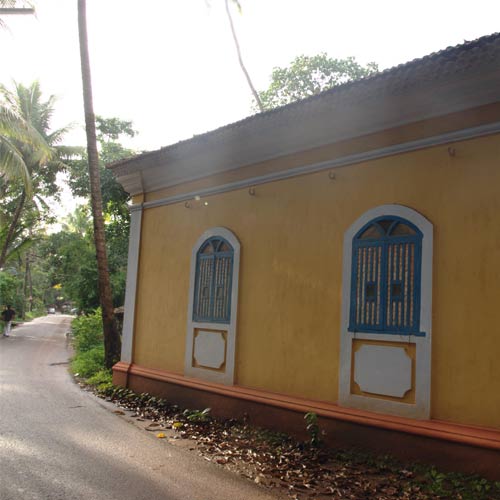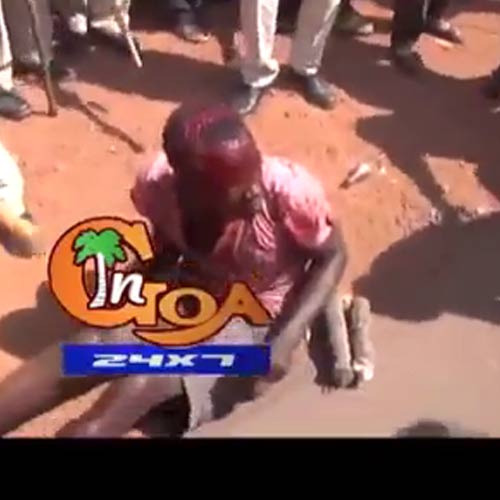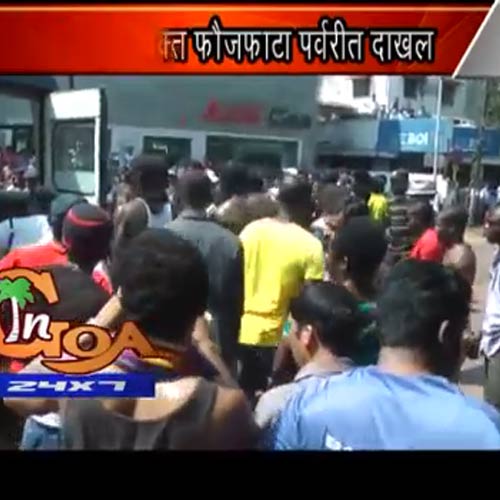
If you followed the news in Goa over the past week, you could easily end up believing that the tiny Nigerian community here was to blame for the many problems facing India's smallest State. But, read between the lines and you could decipher how the Terrible Thursday that was October 31 in fact highlights so many things going wrong with today's Goa.
What really happened, and who was to blame? What you see depends on where you stand, as they say.
Yet, dramatic raw video footage soon made its way online via YouTube.com. It showed a group of Nigerians -- estimated at between 30 to above 50 -- protesting angrily on Goa's arterial road at Porvorim, four kilometres outside state-capital Panaji, or Panjim. It shocked some to see the police appear as by-standers. Other debates voiced dismay at the implications of foreigners blocking the national highway linking North Goa to state-capital and the Dabolim airport.
The Nigerians were protesting the undetected murder of one of them at Parra village. They're a small community here, but visible because few African tourists otherwise end up in Goa.
They blocked the hearse-van from taking his body for an autopsy, and were blamed for dragging the body onto the road. The Nigerians were also seen blocking the road. Local politicians entered the fray, a section of locals held a couple of other rasta-rokos in counter-protest the same day. Two Nigerians were beaten up within inches of their lives, as some in the mob urged others with loud "it's enough (of beating them)" messages.

Even as some 53 Africans, mostly Nigerians, were arrested the same day, other questions remain unanswered. What were they protesting about? What were they demanding? Why did the authorities seem coy in naming the other sides involved in what they called a narcotics turf war? Who was behind the brutal beating up of a couple of Nigerians -- in full view of the cameras? Was it just a random crowd? Why had the police failed so badly in tackling the situation? And, what role did racism really play in this entire sordid episode, which comes at the start of Goa's post-monsoon tourist season?
The previous day, a Nigerian was found murdered in Parra village, about 10 kms from Panaji. The police were very slow in getting to the bottom of this case, or arresting any suspects, even days alter. It was left to a section of the Press, swimming against the tsunami of local chauvinism against the "Nigerians", to name suspects involved in the Nigerian's murder. It pointed to cross-complaints that had been filed prior to the murder, and a local family had allegedly just gone missing.
Nearly a week later, after an angry war of words between Abuja and Goa, one arrest was finally effected of a 24-year-old identified as Surendra Pol. Politicians here meanwhile had already started targetting Nigerians, while local public opinion cheered calls for social boycotts. The excuse: they were staying here illegally, came in as fake students, dabbled in peddling drugs, and generally caused a nuisance in local areas.
But Nigerians are not the first community to be blamed for a fast-changing Goa's many woes. In the past, a competitive media, seeking sensation and scapegoats, has pointed to the "Russian mafia" and targeted Israelis too. Tourism is changing Goa in many ways, but targetting a section of the visitors hardly makes a convincing case.
The murder incidentally took place in the proximity of the home of Michael Lobo, a colourful if controversial legislator, and one of the hand-picked Catholics whose win made it possible for the BJP to romp to power in Goa in the March 2012 elections. His wife, Delilah, is the sarpanch of the Parra village. Both made strong statements -- post the violence -- calling for the pushing out of the Nigerians staying in their locality.
Parra, a sleepy village sandwiched between the North Goa commercial capital of Mapusa and the overgrown and concretised beach belt of Calangute-Candolim, was the unlikely place where the violence erupted.

Like other villages just off the beach belt, in recent years Parra has been reduced to a kind of dormitory village. Agriculture has been impacted by land speculation, and can't keep up with the money tourism offers. Its watermelons, once its prominent produce, face competition from out-of-state crops. Villagers prefer to rent out rooms to low-budget tourists, whose money seems tempting enough till such headline-grabbing cases erupt.
So far, the narcotics trade has been focussed on the beach belt, and in the towns. The former includes Chapora, another former fishing village to which the Nigerians pointed when naming suspects involved in the murder. Drugs are nothing new to Goa; locals have been complaining about this since the 1970s, or late 1960s, only to be repeatedly mocked by those in power, and told that nothing of the kind exists.
If indeed this fight was due to a gang-war fallout, as hinted at by the authorities, should it have been left unattended so long till it spilt out on the roads?
Even worse, the blame-game between the BJP, in power for the past 21 months, and the Congress which ruled for seven years earlier, further complicates matter. Articulate and always on-the-offensive chief minister Manohar Parrikar (57) blamed his Congress predecessors. But, at the ground level, both are parties differ little, and some controversial leaders from either party are known to have close links with the narcotics trade, if not a direct hand in it.
But while Panaji sees nothing wrong going on, the situation on the coast some 15 kms away is openly known. Novels like Elwyn Chamberlain's Gates of Fire have featured this as their theme. Political parties have used controversial politicians to win elections, and then turned a blind-eye to their involvement.
The government had no explanation of what the protesting Nigerians were asking for, and suggested they wanted their ambassador to fly down from Delhi. They were themselves in jail, and their version was not heard. From the emerging facts, their grouse about the police not taking action against the suspects whose names emerged in the murder case was not without basis.
For argument sake, even assuming that both sides were involved in a narcotics-based drug war, the effects of the lack of prompt and consistent action was more than telling.

Parrikar blamed the predecessor Congress government for having "compromised" the police. Yet, the politicisation of the force has gone on unchecked under all governments. The BJP government itself has expanded the police force in a big way twice in the recent past, but argued that since the recruits were sent for training it was short of staff. There have been questions about the politics of recruitments too. Since the mid-1990s, approximately fifty foreign tourists per annum have been dying in each tourism season (roughly from just November-March) from suspected drug overdoses. Goa still lacks labs to undertake forensic drug testing. The media -- local and outstation -- is know to react when a sensational case errupts, such as the Scarlett Keeling case; but otherwise it is business as usual.
As Goa sees its public discourse increasingly taken over by paranoia and hate against The Other, this case has left behind questions of whether a region once known for its openness got caught up with racism too, even before it realised it.